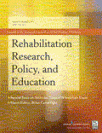
Postsecondary Integration and Persistence: A Comparison of Students With Psychiatric Disabilities to Students With Learning Disabilities/Attention Deficit Disorders
Purpose: The enrollment of students with psychiatric disabilities in U.S. postsecondary institutions is on the rise. However, research is lacking in terms of how these students fare in comparison to other students with hidden disabilities (e.g., learning disabilities [LDs], attention
deficit disorders [ADDs]) whose enrollment in postsecondary institutions is also on the rise. The objective of this study is to compare demographic characteristics, academic and social integration, and persistence of these two groups.
Method: Using the Beginning Postsecondary Longitudinal Study (BPS:04/09) data set, we develop and compare persistence profiles of students with psychiatric disabilities to those of students with LD/ADD. This comparison enabled us to identify characteristics and postsecondary support needs that are shared by both groups as well as those that are unique to students with psychiatric disabilities.
Results: Although the demographic characteristics, academic and social integration, and persistence of both groups reveal similar patterns, chi-square analyses reveal that students with psychiatric disabilities are significantly more likely to be male and significantly less likely to use disability-related services.
Conclusions: The implications of these findings for vocational rehabilitation counselors, transition service specialists, accommodation service specialists in offices of students with disabilities, and campus mental health service providers are discussed, and future research directions for supporting students with psychiatric disabilities to persist in postsecondary settings are recommended.
Method: Using the Beginning Postsecondary Longitudinal Study (BPS:04/09) data set, we develop and compare persistence profiles of students with psychiatric disabilities to those of students with LD/ADD. This comparison enabled us to identify characteristics and postsecondary support needs that are shared by both groups as well as those that are unique to students with psychiatric disabilities.
Results: Although the demographic characteristics, academic and social integration, and persistence of both groups reveal similar patterns, chi-square analyses reveal that students with psychiatric disabilities are significantly more likely to be male and significantly less likely to use disability-related services.
Conclusions: The implications of these findings for vocational rehabilitation counselors, transition service specialists, accommodation service specialists in offices of students with disabilities, and campus mental health service providers are discussed, and future research directions for supporting students with psychiatric disabilities to persist in postsecondary settings are recommended.
Document Type: Research Article
Publication date: 01 August 2016
- Rehabilitation Research, Policy, and Education is no longer available to subscribers on Ingenta Connect. Please go to http://connect.springerpub.com/content/sgrrrpe to access your online subscription to Rehabilitation Research, Policy, and Education.
- Access Key
- Free content
- Partial Free content
- New content
- Open access content
- Partial Open access content
- Subscribed content
- Partial Subscribed content
- Free trial content